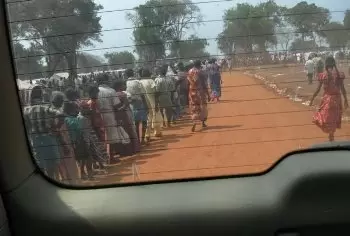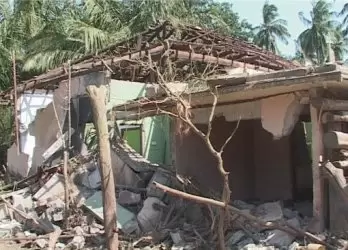LLRC report affirms the need for an impartial enquiry into Lanka’s war crimes

05-January-2012
Vol 3 | Issue 1
After the ending of the nearly three-decade old civil war in Sri Lanka, Human Rights Groups across the world demanded an impartial International Enquiry into war excesses committed by the Sri Lankan armed forces. When the pressure started mounting, the Sri Lankan government quickly formed the Lessons Learnt and Reconciliation Commission (LLRC) to give an impression to the world that it was serious about an impartial inquiry.
However, the real motive of LLRC was to bail out the government from being brought under the scanner of an international commission of enquiry that would have meant big trouble for Sri Lankan President Mahinda Rajapaksa.
 |
|
The LLRC is silent on the 'incarceration' of 282,000 Tamils in the Manik Farm camps for more than a year (Photos: www.warwithoutwitness.com)
|
The Permanent People’s Tribunal on War Crimes against Sri Lanka held at Dublin in January 2010, and the report of the International Crisis Group in March 2010 had already indicted Sri Lanka for its war crimes. The United Nations Secretary General, Ban Ki Moon had also appointed a very credible panel of experts under Marzuki Darusman.
It was only after this the Sri Lankan government appointed the eight member LLRC with only a couple of names from the aggrieved community.
However, international human rights groups were against a domestic investigation for the simple reason that the previous Presidential commissions on many other issues did not bear any positive outcome for the victims.
The chairperson of the LLRC was the attorney general, who is the chief law officer of the present government. Another member was part of the UN ad-hoc Committee on Measures to Eliminate International Terrorism, and a third member served as Sri Lanka’s Permanent Representative to the United Nations during the final stages of the war.
All members were hand-picked stooges of President Rajapaksa. Even at the outset, it became clear that no credible report could be expected from them. The LLRC was in the field for just 17 days, and only 6 days at the war theatre in Vanni out of its tenure of nearly 18 months!
The commission lacked a victim centric approach and it functioned from Colombo instead of from any of the Tamil areas. There were no professional counselors to aid the victims deposing before them.
The LLRC lacked gender sensitivity. Though women and children constituted 80% of the victims, the LLRC had only one aged woman representative. There was absolute lack of transparency, as nobody knew what the commission was working on. There was no provision for a grievance redressal mechanism either.
Witnesses had no security or protection. A witness had to go back and live with the perpetrators of the crime - that is the Sri Lankan armed forces, which has taken over 40% of the land belonging to the Tamils.
The LLRC does not give details of the exact or approximate numbers of civilians killed, missing or unaccountable.
According to records of the Government Agent offices at Mullaiththeevu and Killinochchi districts, the population of Vanni was 429,059 in October 2008. The total number of people who got into government control after the war was 282,380, according to an UN update as of 10 July 2009.
The Catholic Bishop of Mannaar, Rt. Rev. Dr. Rayappu Joseph raised this point in his submission to the LLRC on the 9th of January 2011. “Due clarification should be made regarding what happened to 146,679 people, which is the discrepancy between the number of people who came to government controlled areas between October 2008 – May 2009 and the population reported to be in Vanni in early October 2008,” he stated.
The Bishop had also raised the issues of militarization, colonisation, land grab, Sinhalization, Buddhicisation and civil as well as human rights abuses that continue to take place in the Tamil land following the war. The LLRC has no answers to these very important queries.
The continuation of the high security zones comes at a high human cost. In Jaffna alone, over 60,000 Tamils have lost their homes. Restriction of fishing and cultivation continues in the high security zones everywhere. Outside the high security zones, fishermen need to collect 24 signatures from different officials before they could go out for fishing.
There is also a clear instruction from the government to the churches and the Non Governmental Organizations not to counsel the war affected Tamils or organize life skill training for them, as they claim such exercises would rekindle ‘the old wounds’. By failing to address these important issues, the LLRC has totally failed in its mission.
The UN panel report mentions rape and sexual violence against Tamil women in the final stages of the war and its aftermath. Many video evidences depicted naked bodies of dead women alleged to be fighters. There were also reports from international agencies working in camps of instances of rape in the IDP camps, but the LLRC does not respond to these charges at all.
Though two and a half years have passed since the war ended, the draconian Prevention of Terrorism Act continues. The LLRC has nothing to say about this. The commission speaks of individual excesses by the state forces but does not speak of institutional violence perpetrated by the state during the war.
 |
|
There is no mention of aerial shellings of homes and the lives lost in such attacks
|
It is silent on the expulsion of INGOs and NGOs from the war zone in September 2008, and the ban on private and independent media on covering the war.
There is no mention of the white van abductions, the killing of independent journalist across the island, the recruitment of child soldiers by pro-government para military groups, the plight of the 90,000 war widows from the north and the east, and the incarceration of 282,000 Tamils in the Manik Farm camps for more than a year.
It has not addressed the catastrophic fallout of the economic embargo on the Tamil areas from the end of 2007, the starvation of civilians from June 2008, the continuous aerial bombings on civilian targets, the shoddy resettlement of Tamils, and the state of Tamil refugees around the world.
The only positive outcomes are the recommendations to demilitarize the north and east and to dismantle the paramilitary groups.
The world has read and seen the gory incidents of the war, thanks to the UN Experts’ report, ‘The Cage’, a book written by Gordon Weiss, former UN Spokesperson in Sri Lanka, the Channel 4 documentary, ‘The killing fields of Sri Lanka,’ and ‘I witnessed Genocide’ by Indian TV channel Headlines Today, to name a few.
The Weekend Leader’s documentation of the continuing oppression of Tamils and the ongoing Sinhalisation efforts in its series, ‘Inside Sri Lanka,’ was another proof of the miserable conditions of Tamils in Sri Lanka, even after the end of the war.
The LLRC has proved its loyalty to President Rajapaksa by giving a clean chit to the Sri Lankan state and absolving it of the charges of ‘state terrorism’. The LLRC was nothing but a sham. Only an international enquiry will establish the horrendous truth of Sri Lanka’s genocidal war.
The author holds a Doctorate of Philosophy on ‘Internal Displacement and Human Rights situation in Northern Sri Lanka from Bangalore University. He was one of the four public speakers at the Permanent People’s Tribunal on War Crimes against Sri Lanka















